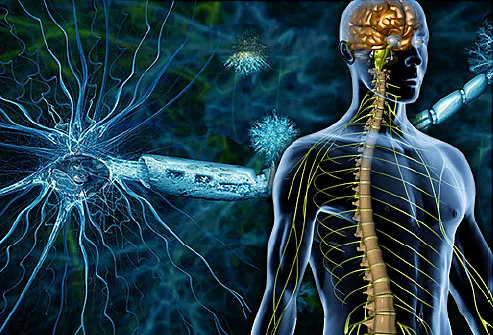Cytokine may play a major role in multiple sclerosis
Multiple sclerosis (MS) is caused by immune cells that activate a cascade of chemicals in the brain, attacking and degrading the insulation that keeps neuronal signals moving. These chemicals, called cytokines, drive the inflammation in the brain, attracting more immune cells, and causing the debilitating disease marked by loss of neurological function. Researchers have long debated which cytokines drive the disease and which are merely accessory. Now, a study published online April 27th, in the Journal of Immunology, confirms that the cytokine GM-CSF (Granulocyte macrophage colony-stimulating factor) likely plays an important role in human disease and offers a new explanation for why the MS treatment interferon-Beta (INF-β) is often effective at reducing MS attacks.
“After our animal studies showed that GM-CSF was important in the development of an MS-like disease, we were excited to see these results confirmed using samples from MS patients in the current study,” says Abdolmohamad Rostami, M.D., Ph.D., Chair of the Department of Neurology at Thomas Jefferson University and director of its neuroimmunology laboratory.
A few years ago, MS researchers were focused on a new type of immune cell called the Th-17 cell, which appeared to be a key player in driving the neuronal damage in MS. Because Th-17 cells produce the cytokine IL-17, researchers likewise thought this chemical was essential to the disease. IL-17, however, turned out to be something of a red herring. In a paper published in Nature Immunology in 2011, Dr. Rostami and colleagues showed that the Th-17 cells also produced another cytokine called GM-CSF, which created a chain reaction with another cell type ultimately increasing the GM-CSF levels in the brain of mouse models significantly. In addition, the researchers showed that in experimental models of MS, mice that were unable to produce GM-CSF never developed the disease, whereas mice lacking IL-17 did develop the disease, though generally developed a milder form.
In the new study, to test whether the same observation was true in humans, Dr. Rostami and colleagues tested blood samples of patients with MS who had not yet received therapy, and those currently being treated with INF-β, a commonly used therapy. On average, untreated patients had two to three times as many immune cells producing GM-CSF as did patients being treated with INF-β, or normal subjects. In addition, the researchers looked at brain samples of deceased patients with MS and found increased numbers of GM-CSF-producing cells in comparison to normal brain samples. “The study demonstrates a new mechanism of action for INF-β therapies,” says Dr. Rostami.
 In addition, a recent Phase 1 clinical trial of an antibody that blocks GM-CSF showed early signs of effect. Phase 1 trials are typically only designed to determine if a new drug is safe, and can’t answer whether a new drug works. However, these results together with the work from the Rostami lab suggest that GM-CSF is a target worth pursuing for the treatment of MS.
In addition, a recent Phase 1 clinical trial of an antibody that blocks GM-CSF showed early signs of effect. Phase 1 trials are typically only designed to determine if a new drug is safe, and can’t answer whether a new drug works. However, these results together with the work from the Rostami lab suggest that GM-CSF is a target worth pursuing for the treatment of MS.
“We hope that this research showing GM-CSF is an important target will lead us toward therapies that more effectively block the damaging immune reaction in the central nervous system of MS patients,” says Dr. Rostami.
###
The research was supported by grants from the National Institutes of Health, 5U19AI082726 and RO1-NS048435. The authors report no conflicts of interest.
For more information, contact Edyta Zielinska, 215-955-5291, .(JavaScript must be enabled to view this email address).
About Jefferson - Health is all we do.
Thomas Jefferson University, Thomas Jefferson University Hospitals and Jefferson University Physicians are partners in providing the highest-quality, compassionate clinical care for patients, educating the health professionals of tomorrow, and discovering new treatments and therapies that will define the future of healthcare. Thomas Jefferson University enrolls more than 3,600 future physicians, scientists and healthcare professionals in the Sidney Kimmel Medical College (SKMC); Jefferson Schools of Health Professions, Nursing, Pharmacy, Population Health; and the Graduate School of Biomedical Sciences, and is home of the National Cancer Institute (NCI)-designated Sidney Kimmel Cancer Center. Jefferson University Physicians is a multi-specialty physician practice consisting of over 650 SKMC full-time faculty. Thomas Jefferson University Hospitals is the largest freestanding academic medical center in Philadelphia. Services are provided at five locations - Thomas Jefferson University Hospital and Jefferson Hospital for Neuroscience in Center City Philadelphia; Methodist Hospital in South Philadelphia; Jefferson at the Navy Yard; and Jefferson at Voorhees in South Jersey.
Article reference: J. Rasouli et al., “Expression of GM-CSF in T cells is increased in multiple sclerosis and suppressed by INF-β therapy,” J Immunol, doi: 10.4049/jimmunol.1403243, 2015.
###
Edyta Zielinska
.(JavaScript must be enabled to view this email address)
215-955-5291